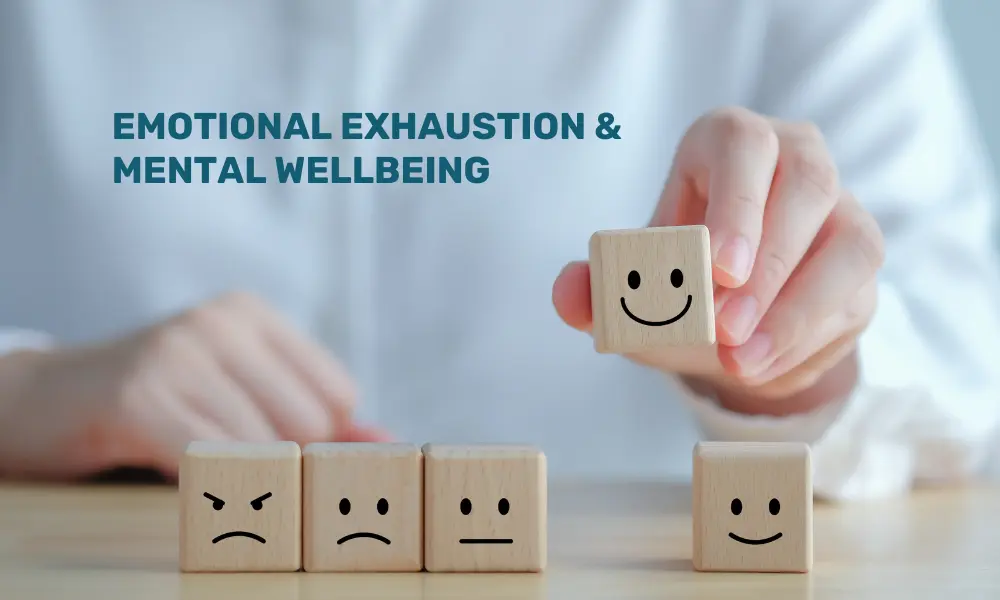With our busy lifestyles and highly competitive environment around us, our mental health is vulnerable to being affected adversely. Therefore, candid conversations around mental health are the need of the hour.
People have become more sensitive and more aware of the importance of mental wellbeing. However, mental health is not just about struggling with depression or anxiety; there are different aspects to it as well.
It is also about handling emotions efficiently. In the hustle culture, emotional exhaustion has become real and affects many without knowing what they are going through.
What is emotional exhaustion?
It is apparent from the term that emotional exhaustion refers to a state of feeling emotionally depleted, drained, and overwhelmed. It is often associated with prolonged periods of excessive emotional and mental exertion, such as dealing with chronic stress, demanding responsibilities, or challenging life circumstances.
Emotional exhaustion can occur in various aspects of life, including work, relationships, caregiving, or personal struggles.
Emotional exhaustion can result from various factors; these may include:
-
Intense Work Demands
-
Chronic Stress
-
Lack Of Work-Life Balance
-
Personal Struggles
-
Relationship Difficulties
-
Combination of the above factors
It can significantly impact mental and physical wellbeing, decreasing overall functioning and quality of life.
Signs of emotional exhaustion
-
Decreased motivation: Losing interest or enthusiasm for once enjoyable activities.
-
Persistent fatigue: Lacking energy and feeling tired despite adequate rest or sleep.
-
Irritability and moodiness: Having a shorter fuse, being easily frustrated, or experiencing frequent mood swings.
-
Emotional detachment: Feeling emotionally numb, distant, or disconnected from others.
-
Increased cynicism: Developing a negative or cynical outlook on life, work, or relationships.
-
Physical symptoms: Experiencing headaches, muscle tension, digestive issues, or changes in appetite.
-
Reduced productivity: Finding it challenging to concentrate, make decisions, or accomplish tasks effectively.
Different people may have different sets of symptoms. Managing emotional exhaustion involves self-care, and adopting strategies to restore emotional wellbeing is essential.
Five Tips to Stop Emotional Exhaustion
-
Self-care practices: One must engage in activities that promote relaxation, rejuvenation, and rest such as getting enough sleep, practicing mindfulness or meditation, engaging in hobbies, and maintaining a balanced lifestyle.
-
Time management: It involves prioritising tasks, setting realistic goals, and managing time effectively to reduce feelings of overwhelm and stress.
-
Seeking support: One may talk to trusted friends, family members, or professionals about their feelings and seek their support and guidance.
-
Setting boundaries: Establish clear boundaries and limits to prevent excessive emotional and mental exertion. Learn to say “no” when necessary and prioritize self-care.
-
Seeking professional help: If emotional exhaustion persists or significantly impacts one’s daily life, then consider seeking professional help from a therapist or counsellor.
It is important to recognize the signs of emotional exhaustion and take proactive steps to address and manage it. Prioritizing self-care, seeking support, and maintaining a healthy work-life balance can prevent and recover from emotional exhaustion.
Emotions make us human, and one should not let them lower morale with life’s challenges. Nurture them for better mental well-being. Consult a professional who can help cope with emotional exhaustion.
FAQ on Emotional Exhaustion
Why am I so emotionally drained?
One may feel emotionally drained due to certain factors like:
-
intense work demands
-
chronic stress
-
lack of work-life balance
-
personal struggles
-
relationship difficulties
How do you deal with emotional burnout?
Prioritizing self-care, seeking support, and maintaining a healthy work-life balance can prevent and recover from emotional exhaustion.
How do you stop feeling mentally drained?
One must engage in activities that promote relaxation, rejuvenation, and rest such as getting enough sleep, practicing mindfulness or meditation, engaging in hobbies, and maintaining a balanced lifestyle.
How can I stop feeling so drained?
Establish clear boundaries and limits to prevent excessive emotional and mental exertion. Learn to say “no” when necessary and prioritize self-care. If emotional exhaustion persists or significantly impacts one’s daily life, then consider seeking professional help from a therapist or counsellor.




